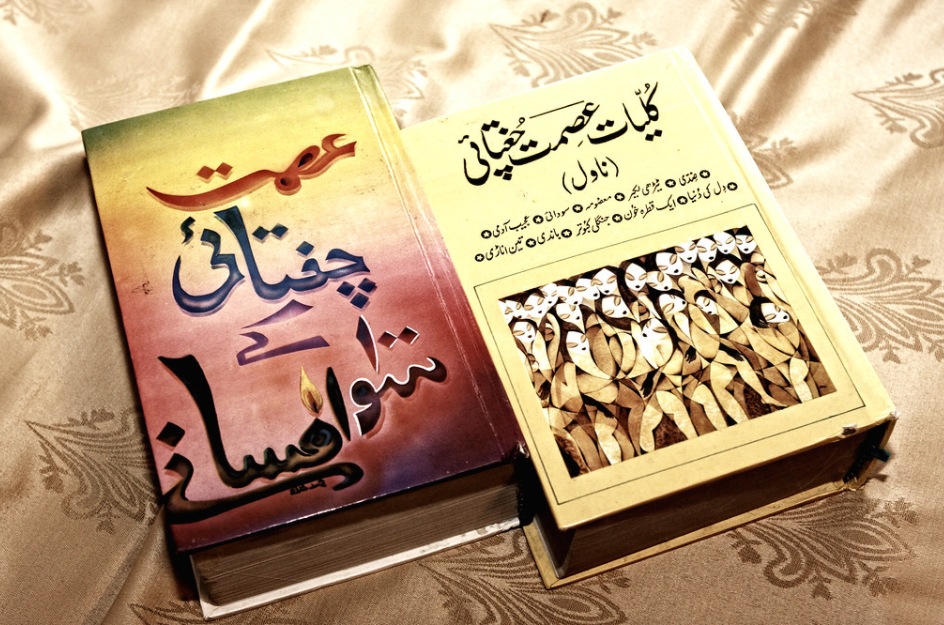
Lihaaf: The Quilt
Ismat Chugtai once remarked, “I write very frankly” and Lihaaf bears the truth of this statement in its entirety. Chughtai’s short story begins with the narrator lost in the labyrinth of her memories, which the Lihaaf, or Quilt reminds her of, but she warns the reader that the story does not promise or bear the imprints of a romance. She takes us back to her childhood, when she was left under the guardianship of Begum Jaan. The story explores multiple themes of subversion enmeshed in a stringent normative structure. Begum Jaan is ignored by her husband, the Nawab, who is busy running behind young boys, while Begum Jaan’s attempts to grab his attention are futile.
In an otherwise bleak life, Rabbo, the Begum’s servant, adds colour by massaging her body to ease her incurable ‘itch’. Through a striking choice of phrases like ‘chasing gossamer shirts’ and Begum Jaan’s incurable ‘itch’ satiated by Rabbo’s ‘massage’ the language of Lihaaf both eludes and entangles the reader. It is the sexual frustration of Begum Jaan that pushes her towards Rabbo and subsequently, in her absence, towards the young narrator, who is horrified at Begum Jaan’s advances. Every night while going to bed, the narrator feels the quilt of Begum Jaan heave and move like an elephant. Petrified when she calls out to the Begum, she is told to chant a prayer and go back to sleep until one night when she switches on the light to discover the truth behind the moving quilt.
Literary Analysis

The narrative builds up casually, cautioning the readers of something amiss while never specifying it. Chughtai’s words are suggestive yet subtle and so is her portrayal of female sexuality. Moreover, the central theme of homoeroticism has dual spacial arenas: the male homosexuality of the Nawab, who chases the “gosammer shirts” and bears their expenses is out in the open, while the female homosexuality of Begum Jaan is hidden under the quilt. Through this distinct demarcation, Chughtai exposes the double standard of the Patriarchy.
When Ismat Chugtai went to Lahore for the obscenity trial after the charges pressed against her on accounts of vulgarity in her story Lihaaf, she was confronted by Mr. Aslam, a fellow Urdu writer whose house she visits in Lahore, about the said vulgarity of her stories. When Chugtai argued that he was as notorious for his obscene language as in his story Gunaah Ki Ratein, Mr. Aslam reasoned that there was a difference—because he was a man. A gender-biased society was perhaps not ready to accept the ‘filth’ it was littered with and that is the reason why Chugtai felt the need to rake it up as she recounts in her autobiographical essay of her trial, Kaghazi Hai Pairahan: The Lihaaf Trial. She writes that only if ‘it’ is raked up will people see and feel the need to clean it up, and yet again with a play of words, Chugtai leaves it up to the readers the interpretation of filth that needs to be cleaned and how it should be done. Whether it’s the oppressive patriarchy or female sexuality that qualifies as filth is never specified by her.
Obscenity Trial: Language and the Law
The winter of 1944 took Ismat Chugtai and Sadat Hasan Manto to the Lahore High Court as a result of obscenity charges being hurled at them for Chugtai’s Lihaaf and Manto’s Bu. Chugtai’s recollection of the courtroom trial and aftermath published in the book Un Byaanhotke Naam (In the Name of Those Married Women), gives us a glimpse of how the trial and the law were gendered and how the two interfered with her public and private domains.
When the trial begins, the witness appears before the court and Chugtai’s lawyer asks him if he finds Lihaaf obscene to which the answer is an obvious yes from the witness. The lawyer then asks him to point out words that he deems obscene and the witness says ‘lovers’ and ‘chest’. Ridding the words of context, cultural and social connotations and presenting them as mere individual words, the lawyer proves that the word wasn’t obscene. The witness then points out the phrase ‘collecting lovers’ had an obscene connotation.The story mentions the young narrator busy picking a fight with her brothers when at her age she should be ‘collecting lovers’ and a cultured woman shouldn’t be writing such vulgar literature. The lawyer then argued that such expectations do not come under the ambit of law.

Chugtai, true to her writing style, lays bare the conflict between law and language. While the law is definite and objective, language is fluid, and through the streams of analogies and metaphors, manages to reach those arenas which the law prohibits, which here are the codes laid down by men to suppress female sexuality. Lihaaf was put to trial because of expected gender norms of female sexuality that it subverted and consequently attempted to challenge the status quo
In her essay Kaghazi Hai Pairahan, she recounts the trauma that the trial brought with it. Everything that followed the trial made her notorious and somehow her worth as a writer was confined to Lihaaf and the surrounding scandal. She received letters filled with profanity and underwent great public humiliation. In the light of these events her marriage had become a “battlefield” where her husband threatened her with divorce because she failed to be an ideal wife—she has brought dishonour and shame to her family. The trauma of the trial and the havoc that it wreaked are but a metaphor that unveils the havoc that patriarchy wrecks in women’s lives.
Conclusion
In closing, Lihaaf did break gender norms on several fronts: a female, writing about female sensuality and homoeroticism faces charges and is asked to apologise, a demand that she denies. She is exonerated and later recounts the trial and reveals the fissures and clefts in law that can be used by the lucid flow of language to expose the hypocrisy of the society. However, Lihaaf is an account of homoeroticism from a heterosexual perspective. While the aspects of homoeroticism is erased, the question of unsuppressed female sexuality takes the forefront. The trial seals Chugtai’s fate, posterity would remember her as the author of Lihaaf. Chugtai becomes a notorious writer and it is only future generations that understand her as a realist.
India gained independence within 3 years of the Lihaaf trial, a trial that brought to the fore the expected gender norms and the hypocrisies of a gender-biased society. The trial did stir public conscience and might have proved to be a starting point to alter India’s prevalent gender norms. Is just one trial enough to uproot the deeply entrenched Patriarchy? How many ruined lives, courtroom cases, daily battles will it take to liberate the oppressed?
Anushka is currently pursuing her Bachelor's degree in History from St. Stephen's College. To weave stories of the past and strike it's relevance in present times and the times to come is her hobby.


